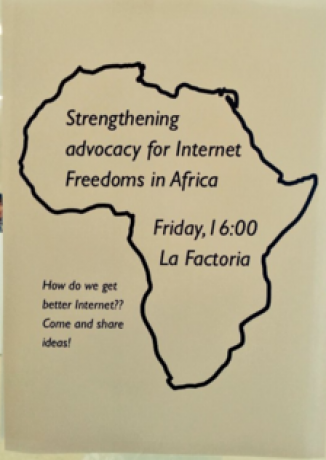Global Solidarity with African Internet Rights at the Internet Freedom Festival, Valencia
Global Solidarity with African Internet Rights at the Internet Freedom Festival, Valencia

Activists from around the world joined a session at the Internet Freedom Festival in Valencia, Spain, to discuss advocacy and global solidarity on internet rights in African countries. Two current initiatives were introduced to the participants: the African Declaration on Internet Rights and FAST Africa. Following these presentations, the participants shared examples of their own projects and advocacy work. I joined an African Internet Rights meeting at the Internet Freedom Festival (IFF) in Valencia, Spain with the commitment to listen to the needs, concerns and priorities of the African participants. The session, “Strengthening advocacy for Internet Freedoms in Africa” took place on 4 March 2016 and revolved around how to advocate for human rights by working for a freer, better and more affordable internet on the African continent. A presentation of two initiatives helped frame the discussions: the FAST Africa grassroots campaign led by Web Foundation for full-speed internet for all, and the African Declaration on Internet Rights, a resource to promote human rights standards and principles of openness in Internet policy formulation and implementation in African countries. Led by journalist and women's rights defender Françoise Mukuku, Sheetal Kumar of Global Partners Digital and Renata Avila, human rights lawyer and Global Campaign Manager of the Web We Want initiative of the World Wide Web Foundation, the session was joined by 15 other participants. All discussions emerged from one key idea: the importance of using, sharing and showcasing strategies and tools “made in Africa” which are adjusted to the context and needs of African countries.
Centering advocacy “made in Africa”
Despite the continent's huge diversity, some of the main challenges and obstacles are common across countries and were a strong focus of discussion, namely: lack of physical infrastructure, lack of affordability, quality and speed, low literacy and ICT skills, and the digital and gender divides. Here are the most memorable points from the discussion:
- Internet access is very broad and has countless elements, factors and implications. It should be moved beyond simple provision of access to the web.
- New research “Women and the Web” offers rich data on the digital and gender divide in African countries.
- There is a growing diversity of projects in African countries that promote a culture of women as makers and coders, at the primary, secondary and university levels such as Akira Chix
- There are many promising African projects at the local level, like community-run mesh networks in South Africa
- Net neutrality in Africa needs more attention, civil society alignment and resources. Without public action, users in African countries are on track to becoming second-class netizens.
- There should be more resources on digital security from the African perspective that incorporate context, threats and concerns.
- More local guides for journalists and human rights defenders are necessary, including guides written in local languages, with words, examples and references that can be understood in the different contexts.
- Inclusion and amplification of minority voices means we need more data on minorities, including LGBTQI communities, to gain special policy provisions.
Joining in global solidarity
The session moved from the frameworks, challenges and opportunities to specific action, with examples of how the participants are organising to help make Africa lead the way in the fight for internet rights advocacy. Stay tuned, get involved, and follow #AfricanInternetRights on Twitter for live news and updates. Are you attending an African Internet Rights event? Share your thoughts and reflections following these guidelines and by emailing us at leila@apc.org and yolanda@apc.org
